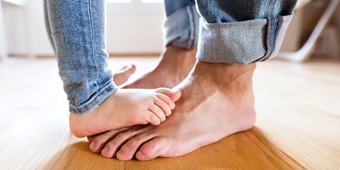Feeling Fatigued? Try Changing Up Your Routine

Find Your Perfect Match
Answer a few questions and we'll provide you with a list of primary care providers that best fit your needs.
Do you ever collapse on your couch at the end of a long day and feel thankful it’s the weekend … just to realize that it’s only Tuesday?
That feeling and the exhaustion that can overcome many of us at the end of the day is fatigue.
Fatigue isn’t a disease itself. It’s a symptom of a bigger issue that you might need to work with your primary care provider to resolve.
“When someone is coming to talk about feeling tired or sleepy, we really have to get to the bottom of what’s causing the fatigue, because something is causing that symptom,” says Seema A. Azher, DO. “We look at fatigue as something where you’re not having enough energy throughout the day to get through normally, or mental exhaustion, where you’re not having the fortitude to continue doing an activity.”
But Dr. Azher emphasizes that fatigue focuses on a lack of energy versus just feeling sleepy. We all need sleep to recharge, so at times, we’ll feel extra sleepy. When we’re fatigued, we have low energy and have a hard time pushing forward.
Lifestyle-Based Fatigue
If your fatigue is more of a short-term issue, it could be from a current lifestyle problem or challenge. For example, you might be getting over an illness, you might have an emotional stressor you’re dealing with, or maybe you have a big test coming up that is becoming mentally exhausting.
“When fatigue is a main concern, and we’re trying to get to the root of it, I always want patients to start with the basics,” Dr. Azher says. “I want you to take a look at your lifestyle, things that go in and out of the body, and things that affect you directly in day-to-day life.”
He gives examples of some specific areas where lifestyle changes can reduce fatigue:
- Diet. We often eat too many processed foods and miss out on the fruits, vegetables, lean meats, and good proteins our body needs as healthy fuel. Try increasing your energy by cutting back on processed foods and excess sugar.
- Exercise. Even though we put a lot of energy into our exercise, it also helps us feel more energetic afterward. If you’re not getting enough exercise, your body doesn’t get enough stimulation, enough of the endorphins, and enough of the training for your muscles and heart that are needed to help you feel better.
- Sleep. You might be in bed for the right number of hours, but are you getting quality sleep? If you’re waking often to go to the bathroom, or tossing and turning frequently, you might not be getting enough rest. Sleep gives your body time to regenerate cells. Not getting enough will cause you to have a hard time thinking and staying focused during the day and eventually will lead to fatigue. If you can pinpoint the reason you’re losing sleep, you can work toward getting all the Z’s you need.
- Stress. Working long hours, being deadline driven, having a major life-changing event, suffering a loss. These can all be causes of stress and can lead to mental and emotional fatigue. It’s important to find ways to step back and relax. Whether that means talking through the problem, taking some time off, or doing something recreational you enjoy, making even small amounts of time to focus on yourself can be refreshing and rejuvenating.
- Substance use. Using any substances, including tobacco, alcohol, marijuana, and illegal drugs, can lead you to feel fatigued. While the buzz can seem beneficial in the short term, your health, including your energy levels, suffers as a result. It’s best to remove these substances from your system and work to let your body heal.
Fatigue From Health Issues
If making lifestyle changes doesn’t ease your fatigue, your provider will start looking at possible health issues, such as an autoimmune disease or anemia.
“Your provider is going to ask you a lot of questions about your fatigue, what your typical energy level should be like, and asking a lot of things about your lifestyle at home. Sometimes, if there are physical problems with any of the glands in the body, or dysfunction of any of your organs, that will sometimes be found on a physical exam,” Dr. Azher says. “We usually start with basic labs if we want to look at some blood work for other causes of fatigue.”
Your lab work could include looking at blood count to rule out anemia, looking at a metabolic panel to check electrolytes, checking kidney and liver function, and checking basic vitamin levels.
“People who live in the northern part of the U.S. tend to have lower levels of vitamin D. Vitamin B-12 and folate, which are vitamins that have a lot to do with metabolism, are also checked,” says Dr. Azher, adding that sometimes taking supplements for these vitamins can be helpful in increasing your energy. But she warns that taking high levels of most vitamins can be dangerous.
If your provider is concerned about a heart issue, he might also want to do an EKG to check the electrical signature of your heart.
If the cause of your fatigue is found to be a medical issue, your provider will then work with you on a plan to treat the health problem, which should help your fatigue.
Find Your Perfect Match
Answer a few questions and we'll provide you with a list of primary care providers that best fit your needs.
Source: Seema A. Azher, DO, Liberty Family Medicine





